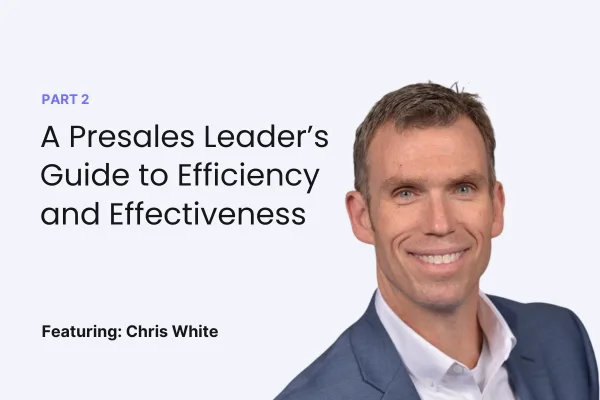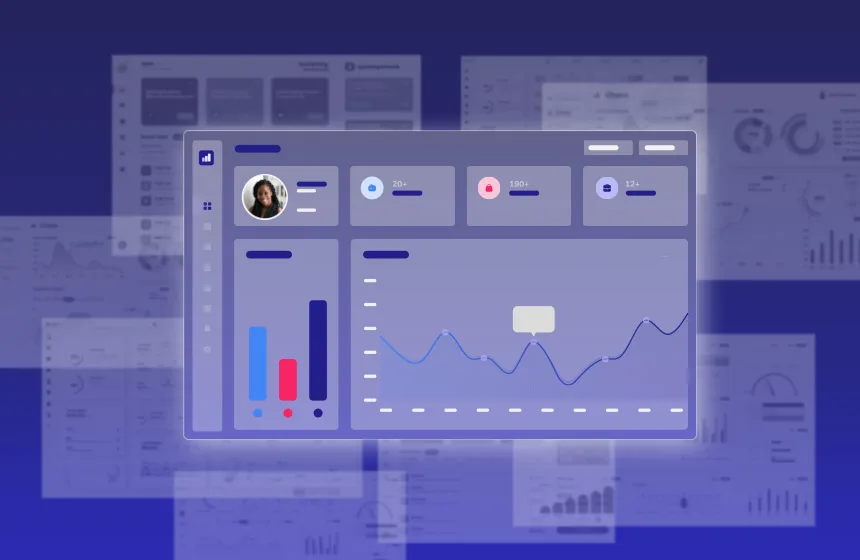Accelerate deals and increase win rates with the leading enterprise demo platform.
A Presales Leader’s Guide Part 2: Creating a Presales Strategy

October 21, 2024
Table of Contents
Part 2: Creating a strategy
Presales leaders: How do you inspire your team to do their best work, while reducing wasted time? That’s the key question we’re exploring in this interview series with Chris White, the founder of TechSalesAdvisors and author of The Six Habits of Highly Effective Sales Engineers. With a more than 30-year career in technical sales and consulting, he’s worked with thousands of sales engineers (SEs), and built a successful framework for delivering winning sales demos.
In our last post, we focused on how presales leaders can evaluate the current state of their team’s efficiency and effectiveness. This post will cover how to build an effective strategy, setting your team up for success in the months ahead.
Reprise: How do you recommend presales leaders start the strategic planning process?
Chris: Start by identifying the goals or outcomes that you want to measure. Without that baseline, you don’t know whether or not you’re effective. Know the goal and eliminate waste.
I’ve put together a presales enablement framework that can help any team create an actionable plan to meet their goals. View this framework in the lens of your own goals by thinking: What do we need to do to be effective in meeting our goals? How are we wasteful with time, effort and resources in context with that objective? From there, you can pull from certain levers within this framework to increase knowledge, develop skills, create collateral, improve processes and technology, or develop programming that will advance our team holistically.
Reprise: What is a good way to map your team’s goals to a larger strategy?
Chris: Ask yourself, “What is the business strategy and sales strategy going into the year?” For example, is the sales organization focused on breaking into a new industry, exploring a platform play, or net new logos? From there, you will be able to make smarter decisions about what that means for your SEs and where they focus their time and resources.
Let’s say the goal is winning new logos. That means your sales organization, as well as your SEs, will have to spend more time having introductory conversations with companies that may never have heard of your company before. They may not be looking for a solution, or even aware of the problem. In this case, there’s a lot more education that needs to be done on everyone’s part. That’s a far different conversation than driving consumption or expansion.
To prepare and adequately plan for that goal, your team may double down on preparing introductory demos for AEs to use in specific verticals. You might put together playbooks that tie common problems and challenges with your solution’s key benefits. You could spend extra time preparing your SEs on what to look for in discovery.
Reprise: How do you shift from a reactive to a proactive approach with your presales strategy?
Chris: SEs by nature tend to be adrenaline junkies. They love a call to action and will parachute into technical conversations with prospects. An area where we tend not to be as strong is non-urgent, yet critically important tasks. That’s where a proactive plan can serve you well.
For example, can you prepare content for a demo library in advance, rather than in response to a meeting request? A demo library focused on specific industries or use cases can save you a ton of time, and you can still tailor them to specific prospects’ requirements or pain points. Or, as a part of your preparation process, can you create send-ahead introductory demos? What about interactive demos as leave-behinds for committee decision-makers?
Presales teams all too often live in a world of reactivity. The more you can create libraries and scripts in anticipation of what’s coming, the more productive and effective your team will be in the months and years to come.
Reprise: Let’s say something isn’t going right. For example, your SEs aren’t getting involved at the right time in a deal. How do you adjust to what’s happening and make a change?
Chris: Often, these issues are a matter of discussing and achieving alignment with sales leadership. What prevents SEs from getting enough face time at the right time in a deal? Usually it is a matter of schedule overload. That can get into team structure and ratios: What is AE to SEs ratio, and how do you balance that effectively?
Or, there may be too many opportunities. In either case, a presales leader needs to go to sales leadership to problem-solve. Maybe it means asking for more headcount, or changing the way AEs and SEs are collaborating. There may be a simple fix. For example, are AEs and SEs preparing effectively in advance of prospect meetings? How can you change current processes to provide adequate time for prep?
Reprise: In 2024, which technology investments should presales leaders plan to make?
Chris: In the past three or four years, there has been an explosion in the number of tools available for SEs. One of the most important categories presales leaders should be exploring is demo automation. A demo creation platform can help presales teams scale their resources more effectively, and help AEs fly solo on first call demos.
In fact, I predict that by 2030, organizations who are not using demo automation will be at a competitive disadvantage. Demo automation is a fast-growing category so I encourage companies to take into account the following purchase consideration questions:
- What scenarios are most important to prepare for?
- Who will need to create and/or own demo assets?
- Do you need to replicate product functionality?
- Do your demos involve third party software?
- How will product upgrades or changes impact your demo assets or demo environment?
- What analytics, insights, or metrics do you need?
There are many other categories of presales technologies, and prioritizing them is a matter of deciding where your team needs to achieve greater efficiency or scalability.
***
That concludes part two of our interview series with Chris White. In part three, we’ll take a deeper dive into how to measure success, exploring some of the secrets of highly effective presales teams.
Want more presales leadership tips? Check out our on-demand webinar with Chris White:







